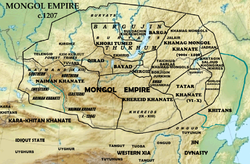Wang Khan
| Keraites | ||||||||||||
| Хэрэйд (Khereid) | ||||||||||||
| Subjects to: Liao, Kara Khitan, Genghisids |
||||||||||||
|
||||||||||||
| Capital | Not specified | |||||||||||
| Religion | Church of the East | |||||||||||
| Government | Khanate | |||||||||||
| Khan | ||||||||||||
| • | 11th century | Markus Buyruk Khan | ||||||||||
| • | 12th century | Saryk Khan | ||||||||||
| • | 12th century | Kurchakus Buyruk Khan | ||||||||||
| • | –1203 | Tooril Khan (last) | ||||||||||
| Historical era | Middle Ages | |||||||||||
| • | Established | 11th century | ||||||||||
| • | conversion to Christianity | |||||||||||
| • | absorbed into the Mongol Empire. | 13th century | ||||||||||
|
||||||||||||
| Today part of | Unconfirmed: Argyn, Kirei | |||||||||||
The Keraites (also Kerait, Kereit, Khereid ; Mongolian: Хэрэйд) were one of the five dominant Turkic or Turco-Mongol tribal confederations (khanates) in the Altai-Sayan region during the 12th century. They had converted to the Church of the East (Nestorianism) in the early 11th century and are one of the possible sources of the European Prester John legend.
Their original territory was expansive, corresponding to much of what is now Mongolia. Vasily Bartold (1913) located them along the upper Onon and Kherlen rivers and along the Tuul river. They were defeated by Genghis Khan in 1203 and became influential in the rise of the Mongol Empire, and were gradually absorbed into the succeeding Turco-Mongol khanates during the 13th century.
In modern Mongolian, the confederation is spelled Хэрэйд, (Khereid). In English, the name is primarily adopted as Keraites, alternatively Kerait, or Kereyit, in some earlier texts also as Karait or Karaites.
One common theory sees the name as a cognate with the Mongolian хар/khar and Turcic qarā for "black, swarthy". There have been various other Mongol and Turcic tribes with names involving the term, which are often conflated. According to the early 14th-century work Jami' al-tawarikh by Rashid-al-Din Hamadani, Mongol legend traced the clan back to eight brothers with unusually dark faces and the confederation they founded. Kerait was the name of the leading brother's clan, while the clans of his brothers are recorded as Jirkin, Konkant, Sakait, Tumaut, Albat.
Other researchers also suggested that the Mongolian name Khereid may be an ancient totem name derived from the root Kheree (хэрээ) for "raven".
...
Wikipedia

